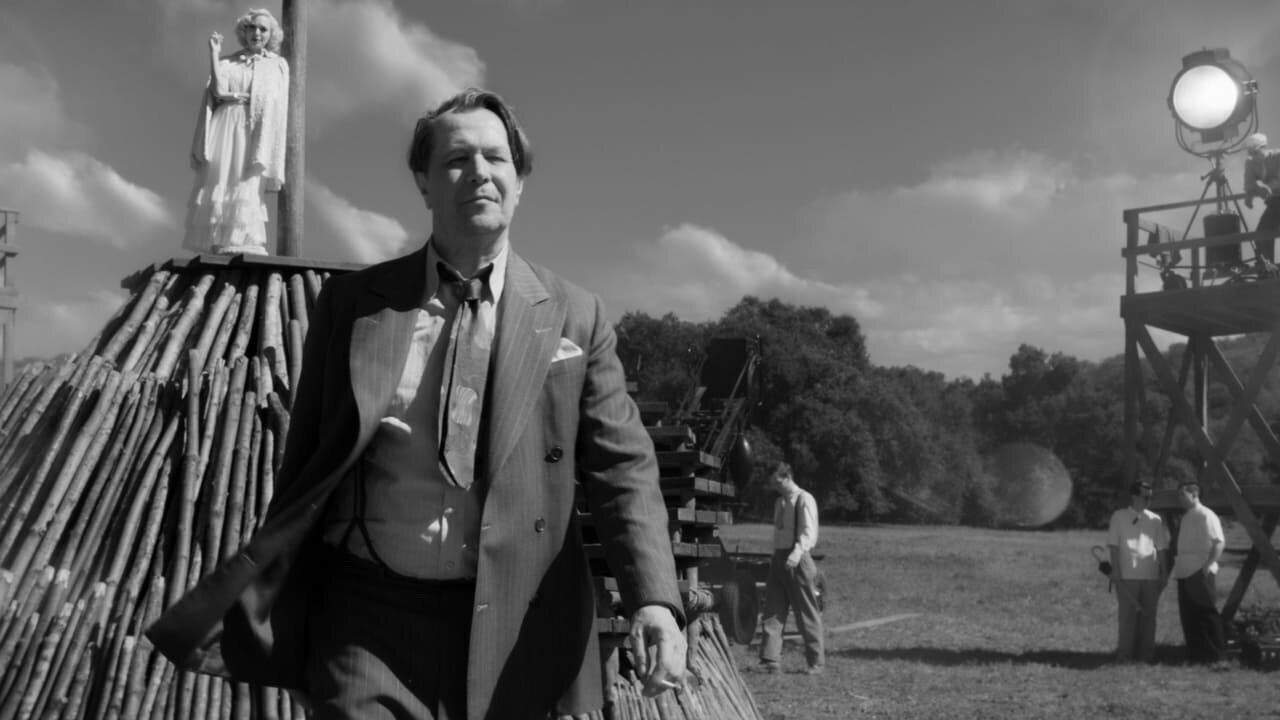Mank
NetflixThe recent release of Mank has been accompanied by considerable buzz in the community of film aficionados. After all, it has been nearly six years since David Fincher directed his last feature film, Gone Girl. What is more, it isn’t just his return behind the camera that has generated interest in the critical community, but rather the film itself. It also happens to be the first time since 2002’s Panic Room that Fincher would tackle an original screenplay, as opposed to a literary adaptation.
In fact, it must be emphasised that David Fincher has been trying to bring Mank, a screenplay penned by his own father Jack Fincher, to the screen ever since his own directing career gained traction. He has been mostly unsuccessful in his quest, as major Hollywood studios did not consider marketable a thinly veiled yet stinging critique of the studio system in the so-called Golden Age disguised as a love letter to arguably one of the most important films of all time, Citizen Kane, and its often forgotten screenwriter, Herman J. Mankiewicz. Thanks to complete artistic control guaranteed by his arrangements with Netflix, David Fincher was able to fulfil his late father’s dream and share this highly complex and personal story with the world.
Suffice it to say that Mank is not a film for everyone and it is sure to discombobulate Fincher’s biggest fans, because it simply doesn’t fit within the parameters of his directorial modus operandi. Narratively contorted, rife with flashbacks, saturated with dense dialogue and flashy soliloquies, and seasoned generously with heavily stylized elements of visual homage to Orson Welles’ perennial masterpiece, the film presents itself as seemingly impenetrable. This stands in stark contrast to the vast majority of Fincher’s back catalogue, which has been consistently approachable and fundamentally entertaining despite being occasionally graphic or otherwise provocative. However, this is not a bug; it’s a feature.
In their attempt to tell this story, the filmmakers were not driven by a desire to sell their film to wide audiences by adjusting to their expectations. Instead, they crafted a film where the viewers must do some mental legwork in order to appreciate it fully. Therefore, it is almost impossible do so without at least a cursory knowledge of classic cinema and – naturally – Citizen Kane itself. Mank is crafted to look as though it was produced in 1940s, complete with occasional deployment of rear projection, elements of sound design, staging and camera work. However, this meticulously engineered aesthetic giving the film its tone and atmosphere is almost completely undercut by Fincher’s decisively modern and characteristically perfectionist direction, which also trickles down to affect the performances. Granted, Gary Oldman, Amanda Seyfried and others put on quite a formidable show and will surely remain in conversation this coming Oscar season, but their characters do not come across as period-accurate. They are clearly directed to act in a decisively ‘modern’ way, which makes Mank look more like a re-enactment instead of a purpose-built time capsule. Again, purposefully so.
This is all because David Fincher’s Mank functions on more than one level. It is a monument in memory of his father, whose own biography carries distinct elements of symmetry with that of Mankiewicz’s. It is a potent deconstruction of the narrative ingenuity underpinning the timelessness of Citizen Kane as well as the singular way in which the film was conceived. It is also a scathing critique of Hollywood portrayed as an ivory tower of rabid capitalism, festering with careless debauchery and nauseating hedonism, which – thanks to Fincher’s decision not to commit fully to the period aesthetic – naturally implies not much has changed. It is all condensed and shrink-wrapped as a dense narrative which jumps frivolously between its multiple settings, anchors itself in historical reality, departs it occasionally to make an artistic point, and showers the viewer with metric tonnes of caustic wit while striving to give Herman Mankiewicz the respect he clearly deserves.
As a result, Mank is a film which is more easily respected than enjoyed. It is a lavish festival of visual references, stylistic nods and winks aimed at the cinephiles in the room who are likely to spot these Easter eggs of meta-commentary the film is littered with. However, at the same time it fails to compel the viewer with the innate strength of its narrative or the magnetism of its characters because the story never slows down or lowers its master volume for long enough to give the audience enough time to establish an emotional connection with the film.
Ironically enough, Mank might have a lot more in common with Alfonso Cuarón’s Roma than with David Fincher’s previous works, with its beautiful high-contrast monochromatic cinematography, sweeping scale and an increasingly personal subject matter. It is also likely to finally earn Fincher the Best Director Oscar, a much-coveted token of recognition by his peers. Similarly, it is probably going to go right over most people’s heads who might not know they should have read up on film history before watching it. Consequently, Mank might resonate with film-lovers who will cherish its attention to detail, technical prowess of its execution and the calibre of its performances. But it will be immediately forgotten by everybody else because it’s just not that fun to watch.


